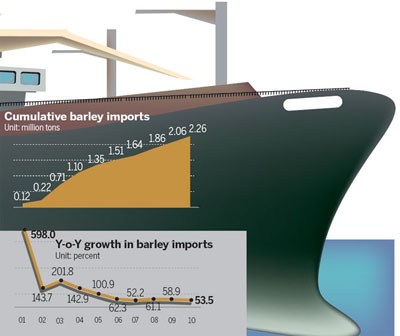
Analysts said the discrepancy in imports was created by the government's minimum purchase price, which shored up domestic grain prices while they declined in the global market because of weak demand caused by the sluggish economic recovery.
"The government should allow the purchase price some flexibility to fluctuate within the international market," said Ma Wenfeng, a senior analyst at Beijing Orient Agribusiness Consultant Ltd, one of the industry's largest specialist consultancies.
Ma also said cheap imports are likely to push down the price of domestic rice while piling up the country's stockpiles with domestically grown corps, which is likely to lead to a waste of the grain in processing and storage.
"The purchase price fell to 140 yuan ($22) from 150 yuan per 50 kilograms" a few months ago, said Liu Yinmei, a farmer in Liyang city of Jiangsu province, cited by Xinhua News Agency.
"I will not sell at such a price. I shall wait for it to go up a bit," she added.
Meanwhile, as large companies scrambled for imported rice, smaller processing mills were at a competitive disadvantage from higher production costs and lower selling price, companies and analysts said.
Xu Weidong, manager of a processing company in Liyang, said: "Our business has been hurt by (rice imports) as the price of processed rice also declined."
China's grain output this year rose 3.2 percent from a year earlier to 589.57 million tons, marking the ninth consecutive year of growth, according to data from the National Bureau of Statistics.
China's corn output this year amounted to 208.1 million tons, up 8 percent from a year earlier. Rice increased by 1.6 percent to 204.3 million tons. Meanwhile, wheat gained 2.7 percent to 120.6 million tons. These numbers show that corn has replaced wheat as China's chief grain variety, the bureau said in an online statement.
zhousiyu@chinadaily.com.cn
